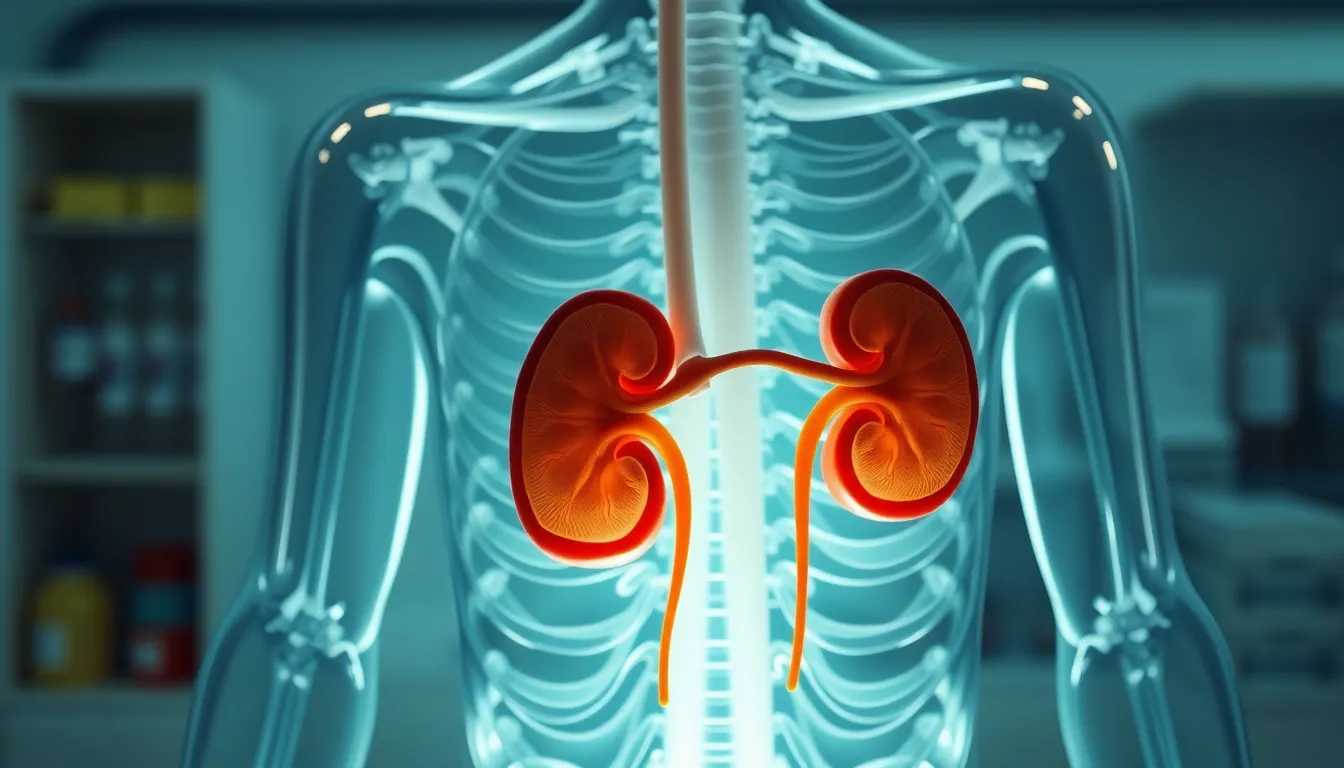The excretory system might not be the first topic that springs to mind when thinking about fascinating biology, but it plays a crucial role in maintaining overall health. This complex network of organs works tirelessly to remove waste and regulate vital bodily functions. Understanding its inner workings can reveal just how remarkable the human body truly is.
From the kidneys filtering blood to the bladder storing urine, the excretory system is full of surprises. Fun facts about this system not only highlight its importance but also showcase the incredible efficiency with which it operates. Dive into these intriguing details and discover why the excretory system deserves a spotlight in the world of human anatomy.
Table of Contents
ToggleOverview of the Excretory System
The excretory system plays a crucial role in waste elimination and the regulation of body fluids. This complex system ensures that metabolic waste does not accumulate, contributing to overall health and homeostasis.
Key Functions of the Excretory System
- Waste Removal: The excretory system eliminates nitrogenous waste, such as urea and creatinine, produced from protein metabolism.
- Fluid Balance: It regulates water levels in the body, helping to maintain blood pressure and ensure proper hydration.
- Electrolyte Regulation: This system controls the balance of minerals like sodium, potassium, and calcium, which are vital for cellular functions.
- pH Regulation: The excretory system maintains the acid-base balance of the blood by excreting hydrogen ions and reabsorbing bicarbonate.
- Blood Pressure Regulation: It produces renin, an enzyme that helps regulate blood pressure through the renin-angiotensin-aldosterone system.
Organs Involved in Excretion
- Kidneys: The kidneys filter blood, removing waste and excess substances to form urine. Each kidney contains approximately one million nephrons that perform filtration.
- Ureters: These tubes transport urine from the kidneys to the bladder, ensuring waste moves efficiently from its site of production.
- Bladder: The bladder stores urine until it is ready to be excreted. It can hold around 400-600 milliliters of urine, signaling the need to void when full.
- Urethra: The urethra is the final conduit for urine, allowing for its excretion from the body. In males, it also serves as a passage for semen.
Fun Facts About the Excretory System

The excretory system boasts numerous intriguing aspects that highlight its significance in overall health. This section explores fascinating statistics and unique features of the kidneys to showcase the remarkable capabilities of this system.
Fascinating Statistics
| Statistic | Value |
|---|---|
| Kidneys blood filtration rate | 50 gallons per day |
| Urine production per day | 1 to 2 liters |
| Nephrons per kidney | Approximately 1 million |
| Water reabsorption | 99% of filtered water |
| Average bladder capacity | 400 to 600 milliliters |
Kidneys filter about 50 gallons of blood daily, producing 1 to 2 liters of urine. Each kidney contains roughly 1 million nephrons, the functional units responsible for filtration. From this filtration, they reabsorb 99% of water, ensuring the body’s hydration levels remain balanced. The average bladder has a capacity of 400 to 600 milliliters, allowing temporary storage of urine until excretion.
Unique Features of the Kidneys
- Dual function: Kidneys serve both excretory and regulatory roles in the body, contributing to fluid balance and blood pressure maintenance.
- Renal cortex and medulla: These two distinct regions of the kidneys perform specific functions related to filtration and urine concentration.
- Highly vascularized: Kidneys receive about 25% of the heart’s output, emphasizing their importance in blood filtration.
- Hormone production: Kidneys produce important hormones, such as erythropoietin, which stimulates red blood cell production.
- Acid-base balance: Kidneys help regulate pH levels in the body by excreting hydrogen ions and reabsorbing bicarbonate ions.
Kidneys carry out essential functions beyond waste removal, reflecting their complexity and vital contributions to the body’s overall homeostasis.
Importance of the Excretory System
The excretory system plays a crucial role in maintaining health through waste elimination and various regulatory functions. This system’s efficiency influences many bodily processes essential for overall well-being.
Contribution to Overall Health
The excretory system ensures the removal of harmful substances, including nitrogenous wastes from protein metabolism. It aids in preventing toxic buildup in the body. Each day, kidneys filter approximately 50 gallons of blood, removing these wastes and producing 1 to 2 liters of urine. This filtering process protects organs and supports optimal function. The reabsorption of nutrients and water within the nephron also maintains hydration levels and electrolyte balance, critical for physical health and function.
Role in Homeostasis
Homeostasis refers to the body’s ability to maintain a stable internal environment. The excretory system contributes by regulating fluid balance, electrolyte levels, and pH. Kidneys control sodium and potassium levels directly through filtration and reabsorption processes. They also help regulate blood pressure by controlling blood volume through fluid balance. The excretion of hydrogen ions and reabsorption of bicarbonate ions within the kidneys assist in maintaining the body’s acid-base homeostasis. This intricate regulation ensures all biological systems function properly, sustaining health and vitality.
Common Misconceptions
Misconceptions about the excretory system frequently mislead many about its functions and significance. Addressing these myths clarifies the essential nature of how the body manages waste.
Myths about Kidney Function
- Kidneys Filter All Blood
Kidneys filter blood but not all of it. They filter about 50 gallons daily, extracting waste and excess substances, but the total volume processed is much higher.
- Only One Kidney is Sufficient
While one kidney can perform necessary functions, having two kidneys provides a backup and enhances filtration capacity. Some tasks become more challenging with just one kidney.
- Urine Composition is Uniform
Urine composition varies based on hydration and diet. Variations in color and concentration reflect changes in fluid intake and nutritional status.
- Kidneys Don’t Need Care
Misunderstanding leads people to think kidneys function without attention. Healthy lifestyle choices, such as hydration and a balanced diet, significantly influence kidney health.
- Kidney Issues Always Show Symptoms
Many kidney problems remain asymptomatic until advanced stages. Regular medical check-ups are essential for early detection.
Understanding Waste Management
- All Waste is Harmful
Misconception suggests that all waste is toxic. The body produces waste products like urea, which are normal but require elimination to maintain balance.
- The Excretory System is Separate from Other Systems
Excretion interacts closely with other systems, including the circulatory system and the endocrine system. Hormonal signals help regulate excretion and waste management.
- Only the Kidneys are Involved in Waste Elimination
The excretory system involves not just kidneys but also the urinary tract, intestines, liver, and lungs. Each organ plays a role in managing waste in diverse forms.
- Drinking Water Affects Only Urine Output
Misconception exists that hydration solely increases urine production. Adequate water intake also influences overall metabolic processes and assists in the elimination of toxins.
- Detox Products are Necessary for Kidney Health
Claims that detox products are essential for kidney function lack scientific backing. The kidneys naturally detoxify the body without the need for special products.
The excretory system is a remarkable network that plays a vital role in maintaining health and balance within the body. Its intricate functions ensure that waste is efficiently removed while regulating essential bodily processes. By understanding the fascinating aspects of this system, individuals can appreciate its complexity and the importance of proper kidney care.
Recognizing the signs of potential issues and debunking common myths can empower people to take proactive steps toward maintaining their excretory health. With this knowledge, they can support their bodies in achieving optimal performance and well-being.




